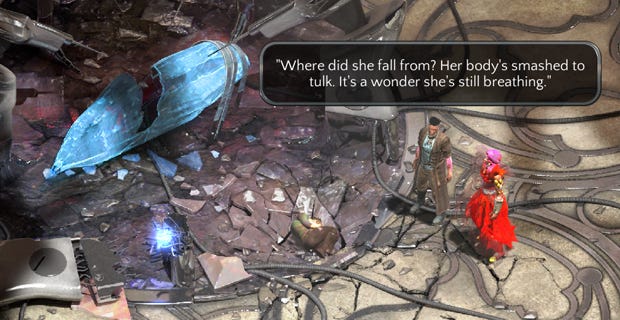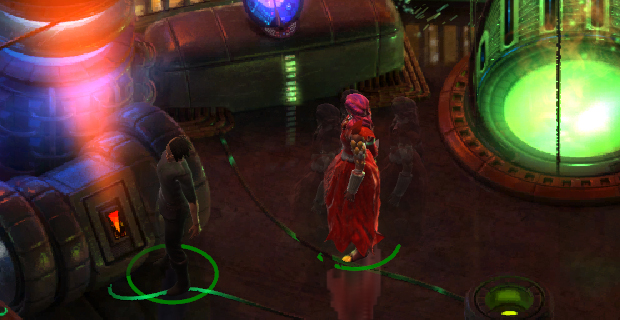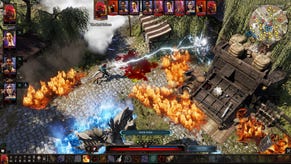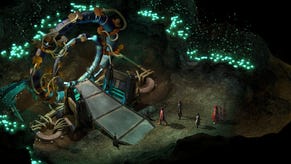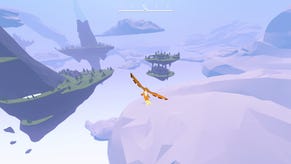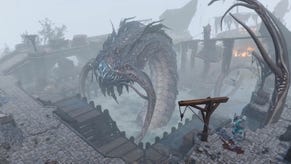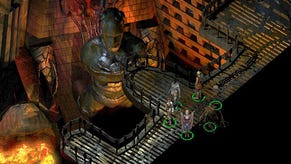Should You Play Torment: Tides Of Numenera's Beta?
Is it going to live up to Planescape?
Turns out you can't play Torment: Tides of Numenera [official site] with your eyes closed. So much for my big plan to try and avoid spoilers. It's simultaneously one of the RPGs I've been looking forward to the most, and the one I've deliberately learned the least about. Planescape Torment fans should need no explanation as to why, but though I apparently have no self-control, it at least puts me in position to tell you whether the current beta is worth your time now or whether you should wait.
Let's get hands on with the only game this year allowed to use any variant of a 'mysterious amnesiac' story without being pelted with rocks and rotten fruit.
It doesn't take long to realise two things - first, that this is the perfect setting for a Planescape style game. The basic gimmick of Numenera is an SF world of fallen civilisations piled atop one another, leaving behind remnants that walk the line between magic and technology in a very different, but thematically similar way to how Sigil, the city at the heart of Planescape: Torment, connected the multiverse and allowed for anything to be around any corner. A big difference though is that while at least the bits of Sigil we visited in Torment are a festering hive of rot and decay, Numenera is a bright and imaginative place, full of light and colour and crystal and towering bridges atop endless cities. It's a far more welcoming place, a far prettier place, with its modern take on Infinity Engine style adventure unsurprisingly able to convey so much more graphical fidelity than Planescape's grimy, zoomed-in maps. The people also seem to have remembered to get dressed in the morning, unlike Sigil's stripperwear fashionistas, even if many do seem to have shown up in superhero costumes for some reason.
The second thing is that when inXile calls this a beta, they definitely mean beta. This slice of the game is buggy as heck, suffering from dialogue tree glitches where you know of characters before meeting them and similar scripting errors, and with its first real combat sequence - using the Crisis system, of which more later in this article - so broken that I've still not managed to play it properly. Luckily, one of the many things Numenera borrows from Torment is a desire for options and love of non-violent solutions to problems, making it possible to entirely skip the hugely scripted, complex encounter just by bluffing your way past. Hurrah for bluffing! Or maybe not!
Easily my favourite thing about Numenera is its sense of personality - something I personally found very lacking in its closest Kickstarter competitor, Pillars of Eternity. The stories just in the opening areas are great. A man being executed by nightmares made manifest as strangling snakes. A builder robot that longs to procreate, even at the expense of its own life. Perhaps my favourite character so far, an upgrade seller incapable of lying, cheerfully discussing the agonising, unbearable pain of his merchandise - merch like 'The Encroaching Darkness'. Ahem. I quote: "I'm not quite sure what it does. It's a living creature, you see, that crawls around your body while you sleep. Eventually they take root in your nervous system and, er, do something. Could be good, could be bad, could be both. It certainly won't be boring! 480 shins."
I'll just pick one of the stories to highlight though, which isn't part of the main plot. The city you're in has an unusual way of making policemen - levies. Think golems created from a vat of constantly recycled gunk. And yes, 'gunk' is a technical term here, with even the person responsible for the process freely admitting to having no idea how to make more of it. That's a recurring theme for Numenera, where having a device definitely doesn't imply mastery of it, or the existence of tools to repair, replicate or even necessarily use an artifact for its originally intended function.
Like most quests, the story kicks off while just chatting to someone and unlocking a bit of lore about the world. In this case, it's a former thug turned baker. Like everyone else, to become a citizen he gave a year of his life to create one of the levies. Soon after though, he starts seeing it following him and suspects that it's trying to kill him for some reason. The actual reason turns out to be much creepier. The year he donated, which saw him reform and put his criminal past behind him is one where he would have committed a crime that led to a devastating fire and the loss of many lives. Now the levy is saddled with the guilt and horror of that alternate future, and it's up to you to persuade his creator to give him a different year, free of second-hand trauma.
That's a hell of an introductory quest, showing off not just weird and wonderful science fiction concepts, but a human warmth that actually makes them matter. This is a world I can't wait to explore properly. The writing is excellent, the characters well drafted, the different factions beguiling. I love that it's a place where you can just walk through a door and find yourself surrounded by a cult of maggot worshipping librarians who see their job as preserving information for their hideous god. And that they have a sense of humour about it. I love that. I love not knowing what to expect, and already this feels like a world built to serve that up far better than your average RPG setting.
If I have one big criticism, and I do, it's that the opening half hour or so before being cut loose in this exciting new world is a truly wretched affair. The whole point of doing an amnesiac hero, why it's such an overused trope, is that it allows the player to learn the ropes along with the character and for the bits and pieces to be slowly drip-fed. Torment for instance didn't offer class choices up front. You began as a Fighter. When you were ready to pick a career, characters were there to explain it. Simple. Easy. You started knowing nothing. You ended up a power to be reckoned with, but with that hard-won knowledge and understanding ultimately proving your greatest weapon.
Numenera instead front-loads an absolute ton of gibbery-guff before you even get started, including a lengthy and jarring Choose Your Own Adventure section in which you replay a (then at least) irrelevant seeming lost memory, and go through a confusing character creation system that starts well by having you choose memories that fit how you want to play, but then instantly outstays its welcome. Before even knowing who you are, you're running around a futuristic lab fighting monsters while also trying to attune with magical creatures to... something... that sounds important?
Look, maybe it makes complete sense if you know the Numenera world and system in advance, but I really hated the whole sequence and how much it expected me to decide up front - or at least, how much it felt like I was having to decide up front. If you're going to do the amnesiac thing, do the amnesiac thing rather than this worst-of-both-worlds approach that obfuscates instead of introduces, and has you making important decisions under totally unnecessary pressure. It's not exciting, it's not welcoming, and, worst of all, it's not even interesting, with the opening combat sequence taken up mostly with dashing between terminals for interminable infodumps that promptly kick the turn-based mechanics right in the proverbial knackers. There's a time to seriously contemplate your personal philosophy and who you want to be. It's not when facing the prospect of having your soul ripped apart by sinister shadow monsters.
It certainly feels like a cheat to have a magic ghost explain the basics of the world in your character creation dream, if you're then going to wake up a clueless newbie, with the worst part about the whole thing being that the world is, as said, heavily populated with helpful people who know just by looking at you what you are, and who are generally willing to take a couple of minutes to help explain things.
The mechanics it sets up are at least interesting. Like Torment, Numenera leans further towards adventure than RPG in many ways. There's no character customisation beyond gender, combat seems pretty rare so far (focusing on the heavily scripted Crisis system rather than random skirmishes), and most encounters are handled through dialogue and skill-checks. The twist is that each character has three skill pools, Might, Speed and Intellect. Instead of just rolling on a stat, as in the D&D model, you spend points from these pools to make challenges easier - to intimidate, to repair an item, to recall someone or something from the past, or whatever else awaits.
So far I've not really felt any need to save them in the regular RPG side of the game, but they become more important during the Crisis encounters where you might be able to affect the gameworld by, say, hacking a computer, or talking an enemy down when it becomes obvious that they're losing the battle and might want to surrender. InXile released a great video showing how the first encounter can play out - I won't spoil it here, but you can watch a few variants over on YouTube. It's okay, I'll wait.
It's a really clever system. My only concern is that inXile is only talking in terms of there being a 'dozen (or so)' of these handcrafted encounters, intended to go from simple fights to time-pressure situations like a prison escape, with a promise of easier fights if you choose to pick them and the NPCs are up for it. You can't just attack anyone you want though, and pretty much nobody I encountered seemed to have a hostile bone in their bodies. Even a group of lightning-spurting rock monsters down in the underground that I'd been charged with removing were oddly happy to just go "Oh, okay, we leave." Hell, even the thugs standing around the dodgy bits of town were more into politely objecting to having their conversations disturbed than being sweaty XP sacks.
More than most Kickstarters though, Numenera is going for something very specific - its name, Torment, not just a statement of intent but one hell of a challenge. So far the actual word, 'Torment', doesn't seem desperately fitting for this game, its main character The Last Castoff coming across as less tortured by a mysterious past as just mildly curious, and certainly lucking into a nicer place to slowly piece it together. In focus and in vibe though, it feels on the right track - not just straight rehashing Planescape Torment (though there's already a couple of 'Adahn' gags), but trying to provide that fresh experience in a whole new world of surprise and intrigue.
Should you pick up a copy now though? I'd say the best answer is whether or not you already know the Numenera universe and so will be visiting a known quantity, in which case your feedback could be invaluable. There's only a small part of the game on offer anyway. If you're coming to it fresh, as most people did to Planescape back in the day, I'd hold fire until its finished. Games only get one chance to make a first impression, and Torment: Tides of Numenera feels like a game that warrants a bit of patience.
Time alone will tell whether or not it boasts the philosophical edge or deep characterisation that helped Planescape cut deep and sink in its talons, but this opening section at least promises an adventure full of personality and fun ideas. That's what I wanted to see from the beta, and as long as inXile is serious about taking feedback on board for its bugs and distinctly wobblier bits, I'm pretty confident the final product won't disappoint. Might even sell more than five copies this time too.
Torment: Tides of Numenera hits Steam Early Access on the 26th. The full game is due later this year.
